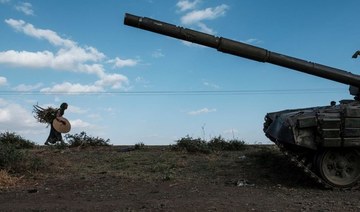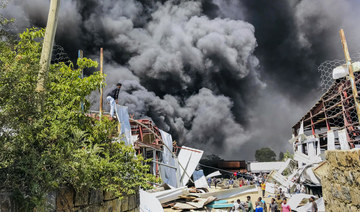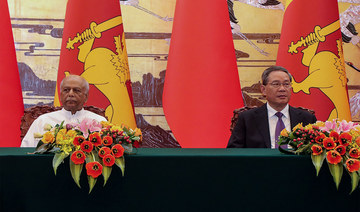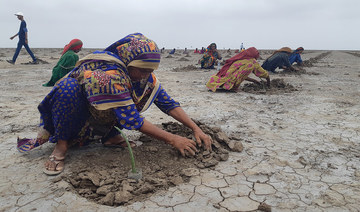NAIROBI, Kenya: The findings of the only human rights investigation allowed in Ethiopia’s blockaded Tigray region will be released Wednesday, a year after war began there. But people with knowledge of the probe say it has been limited by authorities who recently expelled a UN staffer helping to lead it.
And yet, with groups such as Human Rights Watch and Amnesty International barred from Tigray, along with foreign media, the report may be the world’s only official source of information on atrocities in the war, which began in November 2020 after a political falling-out between the Tigray forces that long dominated the national government and Prime Minister Abiy Ahmed’s current government. The conflict has been marked by gang rapes, mass expulsions, deliberate starvation and thousands of deaths.
The joint investigation by the UN human rights office and the government-created Ethiopian Human Rights Commission, or EHRC, is a rare collaboration that immediately raised concerns among ethnic Tigrayans, human rights groups and other observers about impartiality and government influence.
In response to questions from The Associated Press, the UN human rights office in Geneva said it wouldn’t have been able to enter Tigray without the partnership with the rights commission. Although past joint investigations occurred in Afghanistan and Uganda, the UN said, “the current one is unique in terms of magnitude and context.”
But Ethiopia’s government has given no basis for expelling UN human rights officer Sonny Onyegbula last month, the UN added, and without an explanation “we cannot accept the allegation that our staff member ... was ‘meddling in the internal affairs’ of Ethiopia.”
Because of those circumstances, and the fact that the UN left the investigation to its less experienced regional office in Ethiopia, the new report is “automatically suspect,” said David Crane, founder of the Global Accountability Network and founding chief prosecutor for the Special Court for Sierra Leone, an international tribunal.
“What you need when you go into an atrocity zone is a clean slate so outside investigators can look into it neutrally, dispassionately,” Crane said. “You want to do these things where you don’t build doubt, distrust from the beginning,” including among people interviewed.
The investigation might be the international community’s only chance to collect facts on the ground, he said, but because of its setup, it may disappear “in the sands of time.”
People close to the investigation, speaking on condition of anonymity for fear of retaliation, asserted that the head of the Ethiopian Human Rights Commission, Daniel Bekele, underplayed some allegations that fighters from the country’s Amhara region were responsible for abuses in Tigray and pressed instead to highlight abuses by Tigray forces.
That’s even though witnesses have said the perpetrators of most abuses were soldiers from neighboring Eritrea, Ethiopian forces and Amhara regional forces.
In response to AP’s questions, Bekele asserted his commission’s independence, saying it is “primarily accountable to the people it is created to serve.” Attempts to influence the investigation, he added, can come from ”many directions” in such a polarized environment.
Bekele said he and the commission have consistently cited “serious indications that all parties involved in the conflict have committed atrocities.”
Observers say a major shortcoming of the investigation is its failure to visit the scene of many alleged massacres in Tigray, including the deadliest known one in the city of Axum, where witnesses told the AP that several hundred people were killed.
Bekele said the investigation lacked the support of the Tigray authorities now administering the region after Tigray forces retook much of the area in June, about midway through the joint team’s work.
The UN human rights office, however, said the government’s subsequent severing of flights and communications from Tigray during the planned investigation period made it difficult to access key locations, both “logistically and from a security point of view.”
Even the interim Tigray authorities hand-picked by Ethiopia’s government to run the region earlier in the war rejected the joint investigation, its former chief of staff, Gebremeskel Kassa, told the AP.
“We informed the international community we wanted an investigation into human rights but not with the EHRC because we believe this is a tool of the government,” he said.
The UN has said Ethiopia’s government had no say in the report’s publication, though it was given the chance to read the report in advance and to point out “anything it believes to be incorrect.”
Late last week, Ethiopia’s government and a diaspora group released the results of their own investigations focusing on alleged abuses by Tigray forces after they entered the neighboring regions of Amhara and Afar four months ago in what they called an effort to pressure the government to end its blockade on Tigray.
The ministry of justice said it found 483 non-combatants were killed and 109 raped in parts of Amhara and Afar that were recaptured by federal forces in recent weeks. It also found “widespread and systematic looting” of schools, clinics, churches, mosques and aid groups’ offices.
A separate report by the Amhara Association of America said it found that 112 people were raped in several districts covered by the ministry’s findings. The diaspora group drew on data from offices of women’s and children’s affairs as well as interviews with witnesses, doctors and officials.
The diaspora group asserted that the Tigray forces “committed the rapes as revenge against ethnic Amharas, whom they blame as responsible for abuses in their home region.”
The spokesman for the Tigray forces, Getachew Reda, said the allegations aren’t worth “the paper they’re written on.” Accusations of rapes and killings by Tigray forces are “absolutely untrue, at least on a level these organizations are alleging,” he said.
Ethiopia tried to limit rare UN report on Tigray war abuses
https://arab.news/ry4b8
Ethiopia tried to limit rare UN report on Tigray war abuses
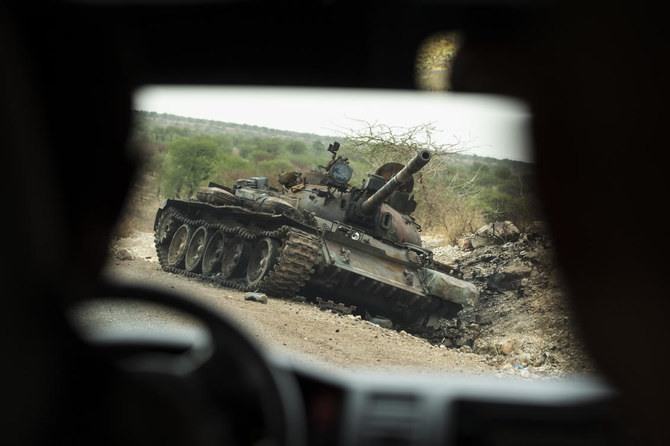
- Witnesses have said the perpetrators of most abuses were soldiers from neighboring Eritrea
- A report by the Amhara Association of America said it found that 112 people were raped in several districts covered by the ministry’s findings
Fake videos of Modi aides trigger political showdown in India election

- Indian police arrest nine people for circulating fake video of Indian Home Minister Amit Shah
- With more than 800 million Internet users, tackling misinformation in India is a huge challenge
BENGALURU/LUCKNOW: Manipulated videos are taking center stage as campaigning heats up in India’s election, with fake clips involving two top aides of Prime Minister Narendra Modi triggering police investigations and the arrest of some workers of his rival Congress party.
In what has been dubbed as India’s first AI election, Modi said last week fake voices were being used to purportedly show leaders making “statements that we have never even thought of,” calling it a conspiracy “to create tension in society.”
Indian police — already investigating the spread of fake videos showing Bollywood actors criticizing Modi — are now investigating a doctored online clip that showed federal home minister Amit Shah saying the ruling Bharatiya Janata Party will stop certain social guarantees for minorities, a subject sensitive for millions of voters.
Shah retorted on X, posting his “original” and the edited “fake” speech and alleging — without providing any evidence — that the main opposition Congress was behind the video it created to mislead the public. The minister said “directions have been issued to the police to address this issue.”
Indian police arrested at least nine people, including six members of Congress’ social media teams, in the states of Assam, Gujarat, Telangana and New Delhi last week for circulating the fake video, according to police statements.
Five of the Congress workers were released on bail, but the most high-profile arrest made by the cybercrime unit of New Delhi police came on Friday, when they detained a Congress national social media coordinator, Arun Reddy, for sharing the video. New Delhi is one region where Shah’s ministry directly controls police. Reddy has been sent into three-day custody.
The arrest has sparked protests from Congress workers with many posting on X using the #ReleaseArunReddy tag. Congress lawmaker Manickam Tagore said the arrest was an example of “authoritarian misuse of power by the regime.”
Congress’ head of social media, Supriya Shrinate, did not respond to messages and an email seeking comment.
MISINFORMATION
India’s election from April 19 to June 1 will be the world’s largest democratic event. With nearly a billion voters and more than 800 million Internet users, tackling the spread of misinformation is a high stakes job. It involves round-the-clock monitoring by police and election officials who often issue take down orders to Facebook and X as investigations start.
In India’s most populous state of Uttar Pradesh, more than 500 people keep tabs on online content, flagging controversial posts and coordinating with social media companies for their removal when needed, police chief Prashant Kumar told Reuters on Saturday.
Another fake video that sparked a storm last week showed Yogi Adityanath, the state’s chief minister, criticizing Modi for not doing enough for families of those who died in a 2019 militant attack. Though fact checkers said the video was created using different parts of an original clip, state police called it an “AI generated, deepfake.”
Using Internet address tracking, state police arrested a man named Shyam Gupta on May 2 who had shared the fake video post on X a day earlier, receiving over 3,000 views and 11 likes.
The police have accused Gupta of forgery and promoting enmity under Indian law provisions that can carry a jail term of up to seven years if convicted. Reuters could not reach him as he is currently serving a 14-day custody period.
“This person is not a tech guy. Had he been tech savvy, arresting him quickly would not have been possible,” said police officer Kumar.
Australian police shoot boy dead after stabbing with ‘hallmarks’ of terrorism

SYDNEY,: Australian police said on Sunday they had shot dead a boy after he stabbed a man in Western Australia’s capital Perth, in an attack authorities said indicated terrorism.
There were signs the 16-year-old, armed with a kitchen knife, had been radicalized online, state authorities said, adding they received calls from concerned members of the local Muslim community before the attack, which occurred late on Saturday night.
The attack, in the suburb of Willetton, had “hallmarks” of terrorism but was yet to be declared a terrorist act, police said.
“At this stage it appears that he acted solely and alone,” Western Australia Premier Roger Cook told a televised press conference in the state capital Perth, regarding the attacker.
The victim, stabbed in the back, was stable in hospital, authorities said.
Prime Minister Anthony Albanese said he had been briefed on the incident by police and intelligence agencies, which advised there was no ongoing threat.
“We are a peace-loving nation and there is no place for violent extremism in Australia,” Albanese said on social media platform X.
The incident comes after New South Wales police last month charged several boys with terrorism-related offenses in investigations following the stabbing of an Assyrian Christian bishop while he was giving a live-streamed sermon in Sydney, on April 15.
The attack on the bishop came only days after a stabbing spree killed six in the Sydney beachside suburb of Bondi.
Gun and knife crime is rare in Australia, which consistently ranks among the safest countries in the world, according to the federal government. (Reporting by Sam McKeith in Sydney; Editing by Christian Schmollinger and William Mallard)
North Korea’s UN ambassador says new sanctions monitoring groups will fail
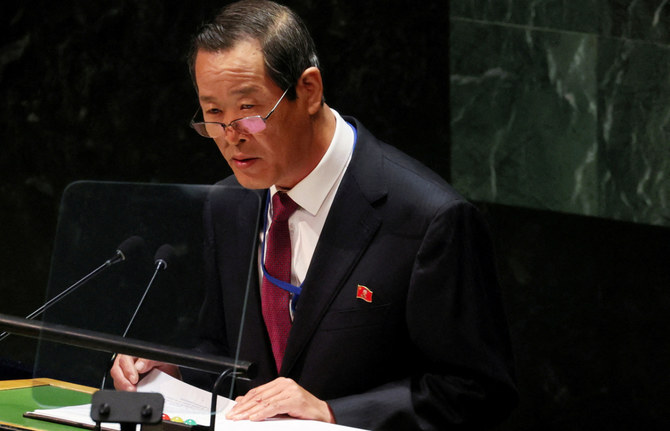
- Earlier this year, Russia vetoed the annual renewal of a panel of experts amid US-led accusations that North Korea has transferred weapons to Russia for use in its war in Ukraine
SEOUL: Efforts led by the US and other Western countries to form new groups to monitor sanctions on North Korea will fail, the country’s UN envoy said on Sunday, according to state media KCNA.
Ambassador Kim Song made the comment in response to a joint statement the US and its allies issued this week calling to continue the work of a UN panel of experts monitoring longstanding sanctions against Pyongyang for its nuclear weapons and missile programs.
Earlier this year, Russia vetoed the annual renewal of the panel amid US-led accusations that North Korea has transferred weapons to Russia for use in its war in Ukraine.
“The hostile forces may set up the second and third expert panels in the future but they are all bound to meet self-destruction with the passage of time,” KCNA quotes Kim as saying in a statement.
Last month, US Ambassador to the United Nations Linda Thomas-Greenfield visited the Demilitarized Zone, a heavily fortified border between the two Koreas, which remain technically at war and urged Russia and China to stop rewarding North Korea for its bad behavior.
Her trip came after Russia rejected the annual renewal of the multinational panel of experts that has over the past 15 years monitored the implementation of UN sanctions aimed at curbing North Korea’s nuclear and missile programs.
China publicizes for the first time what it claims is a 2016 agreement with Philippines

- The move threatens to further raise tensions in the disputed waterway, through which much of the world’s trade passes and which China claims virtually in its entirety
TAIPEI, Taiwan: For the first time, China has publicized what it claims is an unwritten 2016 agreement with the Philippines over access to South China Sea islands.
The move threatens to further raise tensions in the disputed waterway, through which much of the world’s trade passes and which China claims virtually in its entirety.
A statement from the Chinese Embassy in Manila said the “temporary special arrangement” agreed to during a visit to Beijing by former president Rodrigo Duterte allowed small scale fishing around the islands but restricted access by military, coast guard and other official planes and ships to the 12 nautical mile (22 kilometer) limit of territorial waters.
The Philippines respected the agreement over the past seven years but has since reneged on it to “fulfill its own political agenda,” forcing China to take action, the statement said.
“This is the basic reason for the ceaseless disputes at sea between China and the Philippines over the past year and more,” said the statement posted to the embassy’s website Thursday, referring to the actions of the Philippines.
President Ferdinand Marcos Jr. and Duterte have denied forging any agreements that would have supposedly surrendered Philippine sovereignty or sovereign rights to China. Any such action, if proven, would be an impeachable offense under the country’s 1987 Constitution.
However, after his visit to Beijing, Duterte hinted at such an agreement without offering details, said Collin Koh, senior fellow at the S. Rajaratnam School of International Studies based in Nanyang Technological University, Singapore and an expert on naval affairs in the Indo-Pacific region, particularly Southeast Asia.

“He boasted then that he not only got Chinese investment and trade pledges, but also that he secured Philippine fishermen access to Scarborough Shoal,” Koh said, referring to one of the maritime features in dispute.
Beijing’s deliberate wording in the statement “is noteworthy in showing that Beijing has no official document to prove its case and thus could only rely mainly on Duterte’s verbal claim,” Koh said.
Marcos, who took office in June 2022, told reporters last month that China has insisted that there was such a secret agreement but said he was not aware of any.
“The Chinese are insisting that there is a secret agreement and, perhaps, there is, and, I said I didn’t, I don’t know anything about the secret agreement,” said Marcos, who has drawn the Philippines closer to its treaty partner the US “Should there be such a secret agreement, I am now rescinding it.”
Duterte nurtured cozy relations with Chinese President Xi Jinping during his six-year presidency while openly being hostile to the United States for its strong criticism of his deadly campaign against illegal drugs.
While he took an almost virulently anti-American stance during his 2016 visit to Washington’s chief rival, he has said he also did not enter into any agreement with Beijing that would have compromised Philippine territory. He acknowledged, however, that he and Xi agreed to maintain “the status quo” in the disputed waters to avoid war.
“Aside from the fact of having a handshake with President Xi Jinping, the only thing I remember was that status quo, that’s the word. There would be no contact, no movement, no armed patrols there, as is where is, so there won’t be any confrontation,” Duterte said.
Asked if he agreed that the Philippines would not bring construction materials to strengthen a Philippine military ship outpost at the Second Thomas Shoal, Duterte said that was part of maintaining the status quo but added there was no written agreement.
“That’s what I remember. If it were a gentleman’s agreement, it would always have been an agreement to keep the peace in the South China Sea,” Duterte said.
House Speaker Ferdinand Martin Romualdez, Marcos’s cousin and political ally, has ordered an investigation into what some are calling a “gentleman’s agreement.”
China has also claimed that Philippine officials have promised to tow away the navy ship that was deliberately grounded in the shallows of the Second Thomas Shoal in 1999 to serve as Manila’s territorial outpost. Philippine officials under Marcos say they were not aware of any such agreement and would not remove the now dilapidated and rust-encrusted warship manned by a small contingent of Filipino sailors and marines.
China has long accused Manila of “violating its commitments” and “acting illegally” in the South China Sea, without being explicit.
Apart from China and the Philippines, Vietnam, Malaysia, Taiwan and Brunei also have overlapping claims in the sea that is rich in fishing stocks, gas and oil. Beijing has refused to recognize a 2016 international arbitration ruling by a UN-affiliated court in the Hauge that invalidated its expansive claims on historical grounds.
Skirmishes between Beijing and Manila have flared since last year, with massive Chinese coast guard cutters firing high-pressure water cannons at Philippine patrol vessels, most recently off Scarborough Shoal late last month, damaging both. They have also accused each other of dangerous maneuvering, leading to minor scrapes.
The US lays no claims to the South China Sea, but has deployed Navy ships and fighter jets in what it calls freedom of navigation operations that have challenged China’s claims.
The US has warned repeatedly that it’s obligated to defend the Philippines — its oldest treaty ally in Asia — if Filipino forces, ships or aircraft come under an armed attack, including in the South China Sea.
Japan seeks Sri Lanka recovery for regional stability
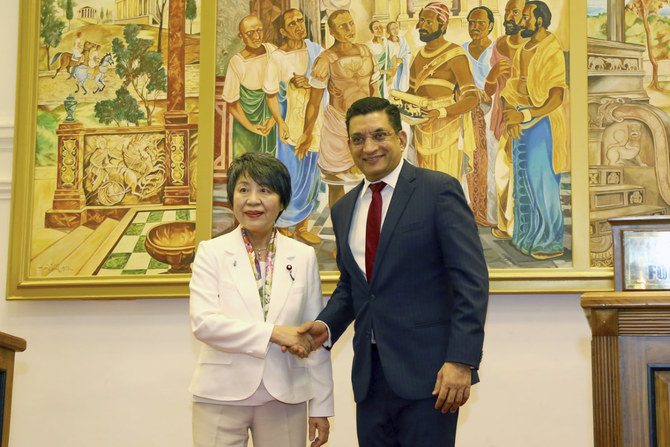
- Colombo has handed over to a Chinese firm a deep sea port built on a huge China loan after failing to pay
- Colombo defaulted on its $46 billion external debt in April 2022 and has failed to finalize any deals with foreign creditors so far
COLOMBO: Strategically placed Sri Lanka’s economic recovery was essential for stability in the Indo-Pacific region, Japan’s foreign minister said Saturday, urging Colombo to swiftly restructure its foreign debt.
Yoko Kamikawa said after talks with her Sri Lankan counterpart that Colombo should secure agreements with bilateral lenders and international sovereign bondholders to unlock suspended foreign funding.
The Sri Lankan government which defaulted on its $46 billion external debt in April 2022 had hoped to finalize deals with foreign creditors by April but there have been no final agreements yet.
Kamikawa said she “stressed the importance of reaching a debt restructuring agreement with all the creditors,” including China — the largest bilateral lender to the island.
“I also conveyed Japan’s intention to further support Sri Lanka’s development by swiftly resuming existing yen loan projects (after a debt restructuring deal),” she said.
She said Tokyo considered Colombo’s economic recovery as crucial for the entire region. The island is located halfway along the main east-west international shipping route.
“The restoration of stability and economic development of Sri Lanka, which is at a strategic location in the India Ocean, is essential for the stability and prosperity of the entire Indo-Pacific region,” she added.
Sri Lanka must secure agreement from all official creditors and a majority of private bondholders to continue with a four-year $2.9 billion bailout loan begun since March last year.
Japan, the second largest bilateral lender to the island has expressed concern about China’s big infrastructure projects in Sri Lanka and elsewhere in the region.
Tokyo maintains that the Chinese-funded projects did not meet international finance standards.
Unable to repay a huge loan taken from China in 2017 to build a deep sea port in southern Hambantota, Sri Lanka handed it over to a Chinese firm for $1.12 billion on a 99-year lease.
Sri Lanka ran out of cash to pay for even the most essential imports in 2022, leading to chronic shortages of food, fuel and medicines.
Then-president Gotabaya Rajapaksa, who faced allegations of mismanagement and corruption, was forced to flee the country and resign in July 2022 after months of protests.
His successor, Ranil Wickremesinghe has raised taxes, cut subsidies and is enforcing painful economic reforms in line with the IMF bailout.



